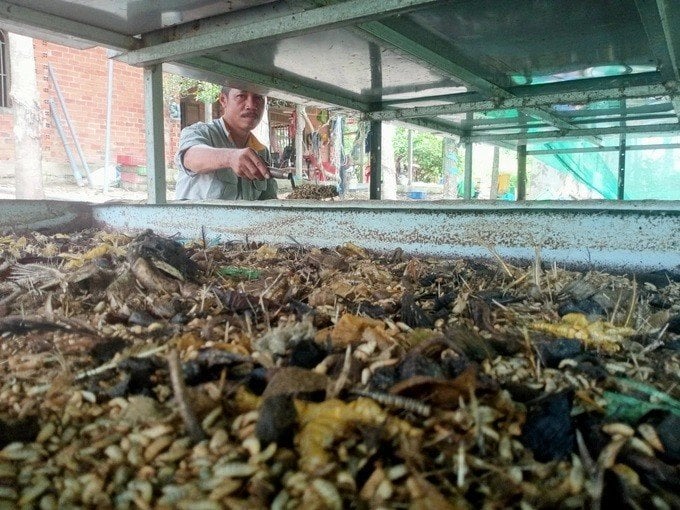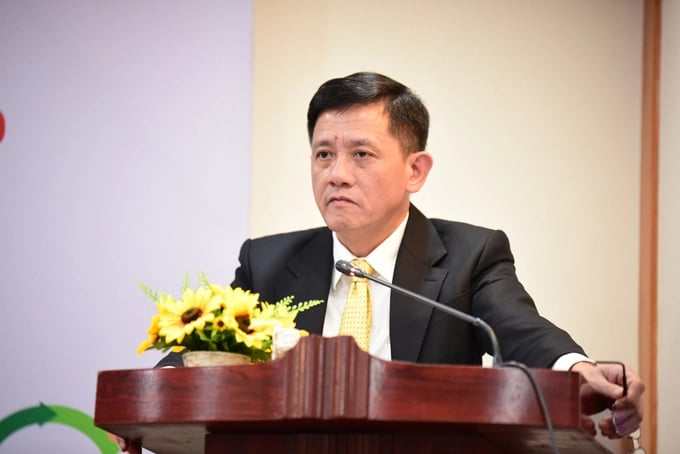June 15, 2025 | 07:00 GMT +7
June 15, 2025 | 07:00 GMT +7
Hotline: 0913.378.918
June 15, 2025 | 07:00 GMT +7
Hotline: 0913.378.918
On March 21, Vietnam Agriculture News collaborated with the Department of Livestock Production, the Executive Team of the Agricultural Product Connection Forum 970 (MARD), and the Australian Centre for International Agricultural Research (ACIAR) to hold "Circular Economy in Livestock Subsector: Opportunity and Challenge".
Mr. Nguyen Ngoc Thach, Editor-in-Chief of Vietnam Agricultural News, and Mr. Duong Tat Thang, Director of Livestock Production, presided over the ceremony.
Dr. Nguyen Van Bac, the representative of the Permanent Office of the National Agricultural Extension Center in the South, advocated strengthening the adoption of research and technological breakthroughs to expedite the development of the circular economy in husbandry.
Dr. Nguyen Van Bac emphasized two key technologies. Secondly, microbial technology plays an important role in the circular economy subsector. The livestock subsector should enhance research on direct and indirect manure treatment, microorganisms on feeds, and waste reduction and economic effectiveness.
Second, insect-based technology has recently gained popularity, particularly in circular livestock production. Mr. Nguyen Van Bac offered an example from the compost worm, "1 ton of compost worm can manage 30 tons of manure in just 1 month. Waste from compost worm helps for plant cultivation, delivering increased economic value".
The Department of Livestock Production announced the certification of the Black Soldier flies, another insect employed in cattle production. Scientists discovered that 1 kilogram of black soldier flies larva could cure 10 kg of organic waste in 15 days. According to a circular model, waste and larva of the black soldier fly are regarded as effective input sources, establishing a basis to increase the growth of the black soldier fly in cattle.

Black Soldier flies, another insect employed in cattle production. Scientists discovered that 1 kilogram of black soldier flies larva could cure 10 kg of organic waste in 15 days.
In terms of policy management, Dr. Nguyen Van Bac advocated that there be criteria to assess the field of recirculating livestock; it is vital to publicize technical achievements to serve recirculating livestock production as soon as possible and broadly as possible.
To transform the circular livestock system into a sustainable chain with companies as the driving force, the Ministry of Agriculture and Rural Development must hold business dialogue sessions on circular husbandry in order to collect data and adapt regulations accordingly. To create and reproduce circular economic models in livestock production, agencies and enterprises must collaborate with the agricultural extension system.
Mr. Duong Tat Thang, Director of the Department of Livestock Production, concluded the forum by stating that the unit will listen to the views presented at the forum in order to formulate development policies for livestock production in particular and agriculture in general.
Looking back on the growth of the cattle business in recent years, Mr. Thang believes that it has made remarkable achievements with the cooperation of the Government, ministries, and communities.
"With a total herd of approximately 30 million pigs, over 500 million poultry, and over 12 million cattle, we have a massive livestock ecosystem that meets the food demands of more than 100 million people while also serving as an export and a source of income for tens of millions of farming households," Mr. Thang explained.

Mr. Duong Tat Thang, Director of the Department of Livestock Production.
Furthermore, the cattle sector has established a system of legal papers and technical standards that is comparable to the rest of the globe and the area. When the cattle business joins in huge playgrounds, this is advantageous.
Mr. Thang did, however, point up several limits of the subsector, such as consumer output, market connectivity, epidemics, waste effects, and waste treatment in animal production. As a result, the circular economy is thought to be an unstoppable trend, bringing actual benefits to agriculture and livestock production such as increased value, agricultural products, and livestock products, and connecting long-term benefits of inter-subsector such as livestock production, crop production, and so on.
Furthermore, Mr. Thang stressed the need for environmental conservation and preservation in the cattle business for the circular economy. The circular economy is also seen as the foundation of green growth and long-term development.
"Among other industries such as animal husbandry, farming, fisheries, and processing technology, the core principle of the circular economy in livestock production is to reduce costs, consume input materials, reduce output emissions, process and reuse livestock waste and agricultural by-products, creating a closed cycle," Thang explained.
If, in the past, the problem of livestock circulation was expressed via several methods such as VAC (garden/pond/livestock pen), rice-fish-duck, straw treatment for microbial fertilizer processing... But, given the present bigger size of livestock production, it is required to adopt a more sustainable step, a newer method that is more in line with global and regional trends.
At the forum, a representative from the Department of Livestock Production underlined the need of using science and technology throughout the world, as well as initiatives by enterprises, local and international scientists, to successfully treat animal by-products. Environmental protection as a result. Mr. Thang claims that this is also a barrier when developing policies for the cattle business.
"The Department of Livestock Production thanks scientists, managers, enterprises, and industry groups for their efforts." "The Department of Livestock Production has collaborated with Ministry divisions such as Crop Production, Cooperatives, Plant Protection, Animal Health, and the National Center for Agricultural Extension to draft appropriate policies for livestock production in the future," Mr. Thang added.
According to Mr. David John Whitehead, Chairman of the Mavin Group's Board of Directors, circular agriculture is not restricted to small agricultural households.
"We have recognized linear agriculture, circular agriculture, and other comparable types. Among them, the goals are to reduce waste created by livestock production activities and to optimize the usage of this waste. For example, reusing waste and by-products to feed livestock, crop production, and other operations, with the goal of utilizing as few resources as possible to get high outcomes. Circular agriculture embraces using fewer input materials, which improves soil quality and the environment while reducing the usage of other resources," Mr. Whitehead stated.
According to Mr. David, "circular agriculture" is not a new concept and has been employed since pre-industrial times with agricultural techniques that mix the use of fertilizers, byproducts from livestock and crops for fertilizer, or as an input source for other operations.
Nevertheless, he stated that in recent years, the aforementioned approaches have been severely impacted by contemporary farming practices, such as large-scale farming, monoculture, and intense farming, which are primarily focused on increasing profits rather than protecting the environment.
Translated by Linh Linh

(VAN) The working delegation from the Ministry of Agriculture and Environment conducted an important trip to the Netherlands to strengthen strategic partnerships and sustainable development in the agricultural sector.

(VAN) The letter ‘A Plea from the Ocean’ not only evokes emotion but also awakens the human conscience to the responsibility of protecting life on Earth.

(VAN) The Department of Agriculture in South Africa has announced the country’s first mass vaccination of poultry to prevent local birds from contracting avian influenza.

(VAN) Establishment of the Mekong Delta Regional Agricultural Linkage Center, aiming for a closed value chain, deep processing, trading platforms, and international market connectivity.

(VAN) Gia Lai province has recently recorded 460 rare species of animals and plants, contributing to forest conservation and biodiversity planning in the region.

(VAN) Ms. Caroline Beresford, New Zealand Ambassador to Vietnam, expressed confidence that agricultural cooperation between Vietnam and New Zealand will develop sustainably, be climate-resilient, and promote gender equality.

(VAN) Vietnam reaffirms its commitment to international cooperation in fostering sustainable and responsible fisheries while ensuring resilient livelihoods for small-scale fishing communities.